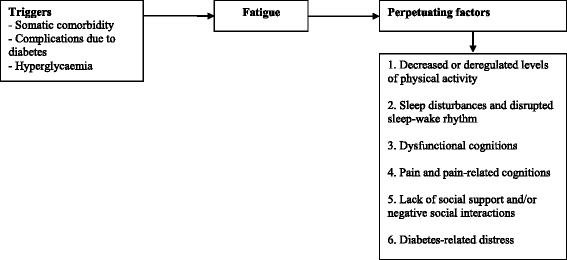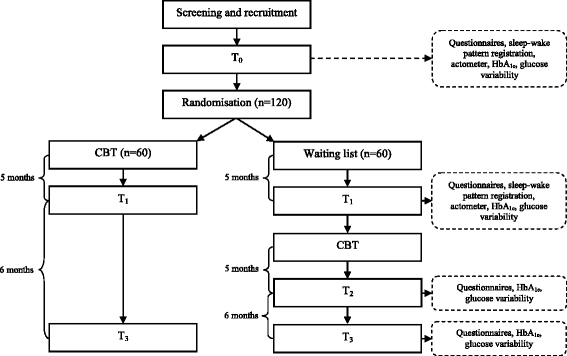A web-based cognitive behaviour therapy for chronic fatigue in type 1 diabetes (Dia-Fit): study protocol for a randomised controlled trial
- PMID: 26044447
- PMCID: PMC4461902
- DOI: 10.1186/s13063-015-0764-4
A web-based cognitive behaviour therapy for chronic fatigue in type 1 diabetes (Dia-Fit): study protocol for a randomised controlled trial
Abstract
Background: Fatigue is frequently reported by patients with type 1 diabetes mellitus. A recent study showed that 40 % of patients experienced severe fatigue that lasted for more than six months and was accompanied by substantial impairments in daily functioning. Currently, there is no effective treatment available for chronic fatigue in patients with type 1 diabetes. Cognitive behaviour therapy aimed at cognitions and behaviours that perpetuate fatigue is effective in reducing fatigue in other chronic diseases. Recent research showed that these cognitions and behaviours are also potential determinants of fatigue in type 1 diabetes. We designed Dia-Fit, a web-based cognitive behaviour therapy for severe and chronic fatigue in patients with type 1 diabetes. This patient-tailored intervention is aimed at reducing fatigue by changing cognitions and behaviours assumed to maintain fatigue. The efficacy of Dia-Fit will be investigated in this study.
Methods/design: A randomised controlled trial will be conducted in 120 patients with type 1 diabetes who are chronically and severely fatigued. Patients will be randomised to a treatment or waiting list group. The treatment group will receive Dia-Fit, a blended care therapy consisting of up to eight internet modules and face-to-face sessions with a therapist during a five-month period. The treatment will be tailored to the fatigue-maintaining cognitions and behaviours that are relevant for the patient and are determined at baseline. The waiting list group will receive Dia-Fit after a waiting period of five months. The primary outcome measure is fatigue severity. Secondary outcome measures are functional impairment and glucose control determined by haemoglobin A1c and blood glucose variability.
Discussion: To our knowledge, this is the first study investigating the efficacy of a cognitive behavioural intervention for chronic fatigue in patients with type 1 diabetes.
Trial registration: Dutch trial register NTR4312 (10 December 2013).
Figures
References
-
- Federation ID. IDF Diabetes Atlas. 2013. http://www.idf.org/diabetesatlas. Accessed 22 May 2015.
-
- Weijman I, Ros WJ, Rutten GE, Schaufeli WB, Schabracq MJ, Winnubst JA. Frequency and perceived burden of diabetes self-management activities in employees with insulin-treated diabetes: relationships with health outcomes. Diabetes Res Clin Pract. 2005;68:56–64. doi: 10.1016/j.diabres.2004.08.004. - DOI - PubMed
Publication types
MeSH terms
Substances
Associated data
LinkOut - more resources
Full Text Sources
Other Literature Sources
Medical



